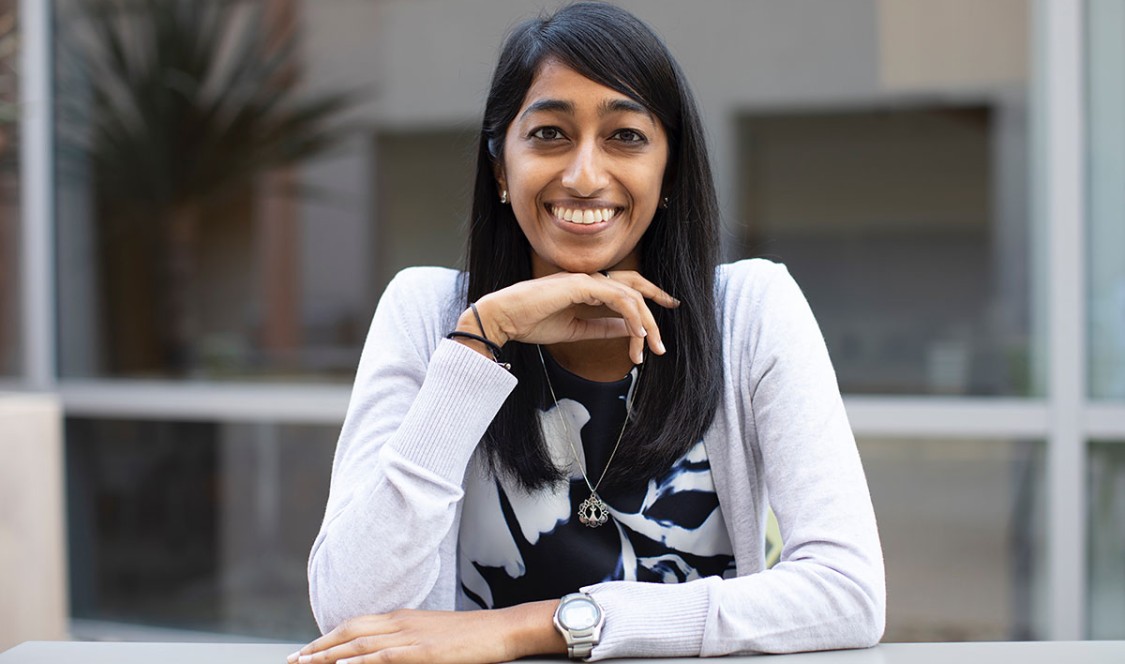The spark: Teaching a cognitive psychology class in graduate school completely changed how Sharda Umanath viewed research. Staying in the lab to study memory was tempting, she said. But exploring both through the liberal arts proved to be the combination she was looking for. “Being at CMC puts a different emphasis on what I do. For my students here, I might be giving them the one research experience they’re ever going to have. It might be the one time I have their full attention to get them to think about how they should assess a research claim, or what they need to evaluate when they see a published paper,” Umanath said. “It’s a special opportunity to be able to teach liberal arts students to see research and science as a way to learn about critical thinking skills they’re going to need in life.”
- Sharda Umanath, assistant professor of psychological science
- Expertise: Cognition, experimental psychology, memory
- At CMC since: 2015
- Hometown: Cincinnati, Ohio
Inside the lab: Umanath studies knowledge and its influence on memory in her Umanath Memory and Aging (UMA) Lab. In four years at CMC, more than 100 senior citizens have helped with UMA Lab research on autobiographical memory. Student research assistants have also collected data related to false memories, or how younger and older people process misinformation. “With older adults, their knowledge base is so solidified,” Umanath said. “If they see a reference in a fictional story that says the Atlantic Ocean is the largest ocean in the world, later on, they’re more likely to stick with saying that the answer is the Pacific. But if you ask an undergrad what the largest ocean in the world is after they see the same reference, they’re liable to say, ‘Oh, it’s the Atlantic’—often even when they know the right answer. I wanted to know how and why this stored knowledge works, and it became my main line of work.”
Age appropriate: So much of aging and memory research focuses on the negative effects of getting older. Umanath doesn’t want to live in that world. “I’m interested in healthy aging,” she said. “Older adults function quite well in society. Because they’re less susceptible to false memories that contradict their prior knowledge, I want to chase that path and capitalize on the fact that they’ve got a general knowledge base that doesn’t decrease until extreme old age. How do we use that to compensate for some of the other deficits that everyone is documenting?” Her favorite side benefit of lab research with older adults: Giving CMCers a chance to counter bias and ageism. “They see how older adults are thriving, whether it’s through tai chi, bridge club, or a service project,” Umanath said. “College students often exist in a very small bubble, but in my lab, they’re cold calling and interacting with senior citizens, learning about their very full and happy lives. There’s a civic engagement aspect to this—not to mention putting to use some soft skills—that I think they end up really appreciating.”
On the rise: Umanath was recently named a Rising Star by the Association for Psychological Science. The designation recognizes outstanding scientists in the earliest stages of their research career. “I’m especially proud to be one of the only professors from a liberal arts school,” said Umanath, who is on a research sabbatical in New Zealand this semester. “The Rising Star award is about research, and I love that I get to do this despite—or maybe because—I’m at a small school where students are being pulled in so many different directions. My students are doing way more hands-on work as undergrads than I ever did, and it’s exciting for that productivity at CMC to be recognized.”
—Thomas Rozwadowski

